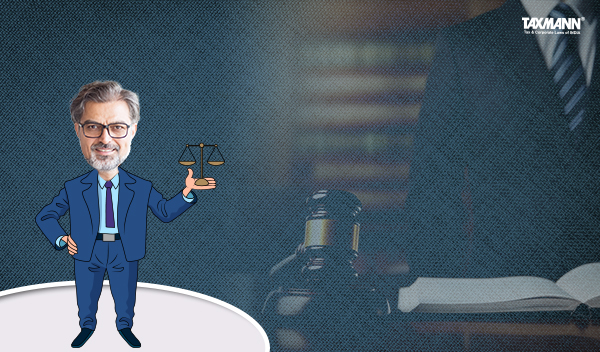Sec. 153C Proceedings Can Be Initiated Only if Seized Material is Likely to Have Bearing on Determination of Income
- Blog|News|Income Tax|
- 2 Min Read
- By Taxmann
- |
- Last Updated on 18 April, 2024

Case Details: Saksham Commodities Ltd. v. - [2024] 161 taxmann.com 485 (Delhi)
Judiciary and Counsel Details
-
- Yashwant Varma & Purushaindra Kumar Kaurav, JJ.
- Salil Kapoor, Sumit Lalchandani, Ms Ananya Kapoor, Ms Tarun Chanana, Shivam Yadav, Vibhu Jain, Utkarsa Gupta, Amandeep Mehta & Sanat Kapoor, Advs. for the Petitioner.
- Sunil Agarwal, Sr. SC Shivansh B. Pandya, Jr. SC & Utkarsh Tiwari, Adv. for the Respondent.
Facts of the Case
The instant writ petitions were filed to challenge the validity of the notices issued under section 153C to the assessee. The contention of the assessee was that the satisfaction of the Assessing Officer (AO) that the seized documents belong to the assessee and have a bearing on the determination of the total income of the assessee was not valid.
High Court Held
The High Court held Section 153C enables and empowers the jurisdictional AO to commence assessment or reassessment for a block of six AYs’ or the “relevant assessment year”, that action is founded on satisfaction being reached that the books of accounts, documents or assets seized “have a bearing on the determination of the total income of such other person”.
The Court held that it would be incorrect to either interpret or construe Section 153C as envisaging incriminating material pertaining to a particular AY having a cascading effect and which would warrant a mechanical and inevitable assessment or reassessment for the entire block of the “relevant assessment year”.
The jurisdictional AO would have to firstly be satisfied that the material received is likely to have a bearing on or impact the total income of years or years which may form part of the block of six or ten AYs’ and thereafter proceed to place the assessee on notice under Section 153C. The power to undertake such an assessment would stand confined to those years to which the material may relate or is likely to influence.
Absent any material that may either cast a doubt on the estimation of total income for a particular year or years, the AO would not be justified in invoking its powers conferred by Section 153C.
List of Cases Reviewed
-
- SSP Aviation Ltd. v. Deputy Commissioner of Income Tax 2012 SCC Online Del 1898 [Para 38]
- CIT V. RRJ Securities Ltd. 2015 SCC Online Del 13085 [para 39]
- CIT (Central)- III v. Kabul Chawla 2015 SCC Online Del 11555 [Para 48]
- ARN Infrastructure India Ltd. v. ACIT, Central Circle -28, New Delhi 2017 SCC Online Del 8081 [Para 52]
- Commissioner of Income Tax v. Sinhgad Technical Education Society (2018) 11 SCC 490 [Para 53]
- Principal Commissioner of Income Tax – 2 (Central) v. Index Securities Pvt. Ltd. 2017 SCC Online Del 10310 [Para 53]
- Principal Commissioner of Income Tax, Central – 3 v. Abhisar Buildwell Private Limited Abhisar Buildwell (2024) 2 SCC 433 [Para 54] – Followed.
List of Cases Referred to
-
- Agni Vishnu Ventures Pct. Ltd &Ors v. DCIT, ADIT, Madras HC 2023 SCC Online Mad 8017 (para 19).
Disclaimer: The content/information published on the website is only for general information of the user and shall not be construed as legal advice. While the Taxmann has exercised reasonable efforts to ensure the veracity of information/content published, Taxmann shall be under no liability in any manner whatsoever for incorrect information, if any.

Taxmann Publications has a dedicated in-house Research & Editorial Team. This team consists of a team of Chartered Accountants, Company Secretaries, and Lawyers. This team works under the guidance and supervision of editor-in-chief Mr Rakesh Bhargava.
The Research and Editorial Team is responsible for developing reliable and accurate content for the readers. The team follows the six-sigma approach to achieve the benchmark of zero error in its publications and research platforms. The team ensures that the following publication guidelines are thoroughly followed while developing the content:
- The statutory material is obtained only from the authorized and reliable sources
- All the latest developments in the judicial and legislative fields are covered
- Prepare the analytical write-ups on current, controversial, and important issues to help the readers to understand the concept and its implications
- Every content published by Taxmann is complete, accurate and lucid
- All evidence-based statements are supported with proper reference to Section, Circular No., Notification No. or citations
- The golden rules of grammar, style and consistency are thoroughly followed
- Font and size that’s easy to read and remain consistent across all imprint and digital publications are applied



 CA | CS | CMA
CA | CS | CMA
